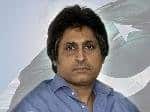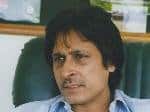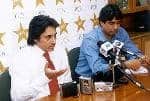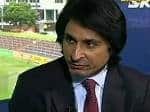Ramiz Raja Pakistani Cricket Players. Rameez Hasan Raja was born on 14 August 1962. He is a former Pakistani right handed batsman in cricket, who represented the Pakistan cricket team during the 1970s and 1990s. He also worked as captain of the national team. Since retiring from professional cricket, he has become a sports and television commentator.
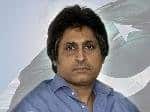
Personal life and education
Raja was born in Faisalbad in Pakistan and studied at notable Pakistani institutions, Sadiq Public School, Bahawalpur and Aitchison College, Lahore and holds a Masters Degree in Business Administration. Raja’s brother, Wasim Raja, also played Test cricket for Pakistan and his second brother Zaeem Raja played First-class cricket in Pakistan.
Career
Raja made his First class cricket debut in 1978. He received his opportunity to play in a Test match against England. His performance was unimpressive, as he was dismissed for 1 run in both innings. However, with the retirement of several players in the Pakistan squad and with the help of his years of experience in first class cricket, Raja was able to secure a spot in the national side.
He played for 13 years in international cricket, appearing in 57 Test match and scored 2 centuries at an average of 31.83. In the One Day International arena, he played 200 matches and scored 9 centuries. He was a member of the national side that reached the semi finals of the 1987 World Cup. He scored 2 centuries in the 1992 World Cup, which was held in Australia, including a century, against New Zealand, who had been un defeated during that period.
Raja was awarded the man of the match for his match winning performance which earned Pakistan a place in the semi-finals of the tournament. In the final against England, Raja had the honour of taking the final catch which won the world cup for Pakistan. This became the pinnacle of his cricketing career, as within a year of this triumph, he had lost form and was dropped from the national side.
However, he was recalled back to the Pakistan squad and played in the 1996 cricket World Cup. During the 1995-1996 season, he was removed from the captaincy, after Pakistan lost their first home series to Sri Lanka. His final game in a Test match for Pakistan, was as captain in the 1996-1997 tour of Sri Lanka, however the team failed to win a match during the series. He retired from all forms of cricket in 1997 and since then he has been active as a television commentator and as an administrator for both Pakistan and International cricket.
Raja has worked as a commentator on Test Match Special and Sky Sports, during the 2006 England Test series against Pakistan. He has also worked as the chief executive of the Pakistan Cricket Board, but resigned from his job in August 2004, citing increasing media commitments.
1987-1988: Given out for obstructing the field
Raja became the first player in One Day International history to be given out by “obstructing the field” against England, in a match at Karachi in 1987. England had scored 263 runs for 6 wickets during their 44 over innings. English batsman, Graham Gooch scored 142 runs off 134 balls and David Capel with 50 runs off 40 deliveries. In return, Pakistan had to score quick runs in 44 overs, to win the match.
Raja opened the batting innings with Shoaib Mohammad, who scored 37 runs off 62 balls. Raja only managed to score at 4.9 runs per over and had reached 98 runs when the last ball of the match was bowled, with Pakistan needing 25 runs to win in the last over. During this last over, he hit the ball and sprinted for two runs that would have given him his century, but was well short of the crease when the fielder’s return came towards him and Raja knocked the ball away with his bat. He was thus the first batsman to be given out “obstructing the field”.
1995-1996: Captain of Pakistan Cricket team
Almost a decade later, he was involved in another controversy when he captained Pakistan to their first Test home series loss against Sri Lanka in September 1995. Before being brought in as captain for the series, he had often opened the batting innings with both Aamer Sohail and Saeed Anwar at different match, but without success. As a captain, he did not open the innings in any of the three Test match and opted to bat at number three, his preferred position. He was sacked as captain after Pakistan lost the series and was replaced by Wasim Akram. He got a second chance at captaincy when, immediately in the next season in 1996-1997, he led the Pakistan team for the second time in two Test match against Sri Lanka in Sri Lanka, but failed to achieved a win. This was his final appearance in a Test match for Pakistan.
2003-2004: Pakistan Cricket Board
Raja worked as a CEO of the Pakistan Cricket Board, simultaneously serving as a cricket commentator. He resigned from the post of the CEO in August 2004 citing increasing media commitments as the reason for his decision.
Interview
‘Factions are a thing of the past’
Rameez Raja, the former Pakistan captain and opening batsman, played in 57 Tests and 198 one-day internationals between 1977 and 1997, and was a member of the team that won the World Cup at Melbourne in 1992. These days he is better known as a commentator for Ten Sports, and he spoke about Pakistan’s triumph in the recent Test series against England
You said in your newspaper column that this is the “beginning of a new era” for Pakistan cricket. What makes you so sure?
I’ve been watching them very closely for the past couple of years, and ever since Bob Woolmer took over as coach and since Inzamam-ul-Haq became regular captain, this team has grown and matured. It fights back, it plays as a unit and the combinations selected have been superb. They’ve picked the right players for the right conditions, and the confidence of the players and the settled dressing-room atmosphere has been reflected in strong performances on the field.
That unity in the dressing-room seems to be the one thing that sets this team apart from previous Pakistan sides
Yes, I think so. Factions are a thing of the past, and Inzamam has become a great father figure to the team. But the big difference is that he is getting great support from Shoaib Akhtar and that is crucial. In the past you could justifiably have called Shoaib a spoilt brat but, because of the healthy cricketing environment, he’s been forced to tow the line. The rest aren’t nearly as difficult to command, and Inzamam has such a good temperament that the young players are at ease around him. And because there are no factions, there is a respect for one other and respect for on-pitch performances. If you perform you stay in, if you don’t, you struggle.
Shoaib missed the India series and the tour of the West Indies, and he recently turned 30 as well. Do you think he’s realised that, if he’s going to make an impression, it’s got to be now?
That’s right, but that’s not the only reason. He needs to be popular, and he needs to contribute and make a name for himself, and he’s realised this is his platform, not county cricket or socialising with Indian film stars. This is where he belongs, and the fact that he’s finally realised that is extremely good for Pakistan.
Inzamam’s even temperament seems crucial as well. He strikes me as a man without agenda, which perhaps couldn’t be said of previous captains
He’s grown into the job as well. I find his tactics quite inspirational, especially when it comes to the all-important final day or the fourth innings, or when the team has been pushed to the wall. He’s come up with some bright ideas, but he’s also got the tools to implement his plans as well, because of the variation and depth of his bowling line-up. But above all he’s calm, quiet and great with the youngsters. I hardly ever see him reduced to a panic situation, but that’s as much to do with the good temperaments of the young players in his side.
Have you ever seen him batting better?
No, this is the best I’ve seen him bat. First his century against India at Bangalore in his 100th Test, then a matchwinning hundred against West Indies, and now this. He’s made 17 matchwinning hundreds out of 24 and that’s a tremendous record. He thrives in crucial, critical, tense situations, which sets him apart from most other Pakistani batsmen, and international batsmen for that matter. He’ll score them when they really matter.
His century against Bangladesh in Pakistan’s one-wicket win at Multan is an example of how great a batsman he is. He is brilliant at playing the game with the tail, because he has an idea of when to defend, but when he needs to hit he’ll hit it. He reads a situation so well. He’s powerful but also technically well equipped to handle any situation, and that’s why he’s so exciting to watch. And it’s not as if he’s just scored runs against weaker teams either. Yes, his record against Australia and South Africa could be better, but if he plays against them now, especially here in Pakistan, he’d bat wonderfully well.
A strong religious belief seems to be a very important factor in the success of this team. Is that something new to Pakistan cricket?
Was very new, but this is just their way of bonding, and if it works, good luck to them after that. It is clear that religion is nothing special, but this team is very keen to make sure they attend to it. Seems to be their way of staying together as a single unit, and their involvement with each other every day, and it seems to work for them, not the least of the last to convert, and Mohammad Yousuf. Should be is under a lot of pressure, because he was a hero as John also. Everyone loved him, and I enjoyed the way the Christian community backed him all the time. I do not know how they feel about it now, but as far as its contribution to their own Muslim batsman goes, what he had done well. It was under a lot of stress and he had family problems and pressure from the Christian community, but good luck to him.
Do you think England under-estimated their challenge out here?
They are certainly not as well-prepared they would have liked to be, and it could be that the sheer effort of the Australia series has sapped their energy and passion. But this was always going to be a difficult tour for England, because historically they have not been willing tourists to this part of the world. Even so, they are a far more professional team these days and they knew full well how much was at stake on this trip – their overall ranking and the chance to prove how good a team they are after beating Australia. I think they caved in because they couldn’t come up with the goods to seize the initiative and come to grips with the conditions. Each player left it to another, and on the day, the others weren’t good enough.
What was the worst aspect of their play, as far as you’re concerned?
They produced casual careless cricket, especially on that last day at Lahore – Pietersen’s drive off the back foot when there was a slip, a silly mid-off, and a gully in place; Flintoff’s extravagant drive to a wrong’un. You can question their attitude and ability as well, because England couldn’t really knit partnerships together in both innings of a match – they’d be good in one and then falter in the other. Likewise their bowlers would be good for two or three hours, but they weren’t as consistent as a Shoaib or a Kaneria. That was the real difference. Pakistan had the better tools, and England were under-resourced.
What tools did England lack?
They need to work really hard to find a quality spinner. Ashley Giles was pretty successful when he came in 2000, but that series was played in different weather conditions and on drier pitches that had been made for spinners. This time they were made for batsmen and that was the difference. If England are to become a powerful and reputable team, then they need to develop their spin department.
How do they go about doing that?
They need to shake up their entire system. They need to prepare good supporting pitches to encourage spin bowling, and that should start at club level. And out of the 18 counties, there should be seven or eight spinning tracks, which would aid the batsmen as well. I feel at times they don’t use their feet and are not as wristy as required. That’s why so many sweep shots led to their downfall in this last match. It’s an ugly option, especially on a batting pitch like this, where you need to be going down the track and reading the ball in the air, or smothering the spin. England have a one-dimensional batting attack against the spinners, and their lack of a wrist-spinner is a big problem.
After Lahore, Duncan Fletcher complained that England had developed a siege mentality because of spending too much time in hotel-rooms. What did you make of his comments?
Well, we faced the same situation when we went to India – we had police around us and felt surrounded all the time, but as professional cricketers you’ve just got to look at why you’re here. It is your job to perform from 9 to 5 then unwind in your own particular way. Sure, this place is not as socially active as England or even India but, at the end of the day, you’ve come here to play cricket and you’ve got to get on with it. I wasn’t in the England camp so I don’t know what the mood or the pulse was, but from a distance it gave the impression they were moaning. So for Fletcher to say that after losing the series probably wasn’t the right tactic. You can always quote cricketing problems at such moments. The social problems were there before the series and during it as well. Why mention them now?
Do you think that their “Presidential levels” of security were over the top?
They were overwhelming, yes, and that can put you off. But we are a cricket-loving nation, and if the players had ventured out even with minimal security, they would have been treated well and welcomed with open arms. Lahore in particular has some fine restaurants, and though Multan must have been tough, Faisalabad should have been a little better, I hope. The bottom line is that they have cricketing problems. Perhaps 5 or 10% of their defeat could be attributed to the overwhelming security. In reality, they’ve been dented by a better team.
How does this Pakistan team compare with the world-beating side of the late-1980s and early 1990s, that you were a part of?
In terms of spirit, dedication and unity, I would put them on a par with our team. In terms of talent, we probably had a better bowling attack – Wasim, Waqar, Mushtaq Ahmed – but the batting these days is probably a little bit more solid. For us there was only really Javed [Miandad], the hero in the middle order, although Imran batted well for us as well. But in terms of spirit and application, it is improving, and it could easily match the 1992 World Cup team.
How do you compare Inzamam and Miandad?
That’s a tricky question. I’ve enjoyed Inzy’s success thoroughly, because I played with him as well as with Javed. But they are very different players. Javed was street-smart, but Inzamam is a little easier on the eyes. Both were very good under pressure, but Inzy has tremendous power – he’s all grace and power and can pulverize any bowling line-up. Javed was more of a nudger who’d look first and foremost for singles. But both have served Pakistan really well, so it’s difficult to compare. In the present era, Inzy is best batsman we produced in a decade, and before that, Javed was the man.
After the one-dayers, you’ve got India coming up. What’s your prediction?
It’s going to be a good series. I think a 1-0 win against England wouldn’t have bothered India much, but at 2-0 I’m sure they would have taken notice. But the key thing is the pressure. Pakistan tend to play well against India in India, but local pressure and expectations can pull them down. I hope that doesn’t happen again, because last time [in 2003-04] they could easily have won the one-dayers and the Tests. They couldn’t get it right on that occasion, but hopefully this time it’ll be different.
